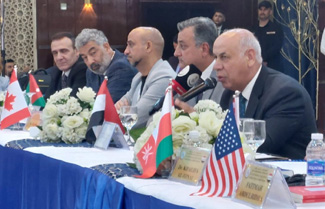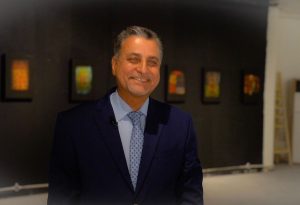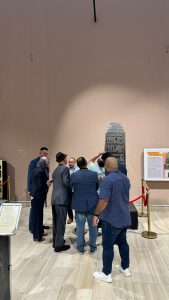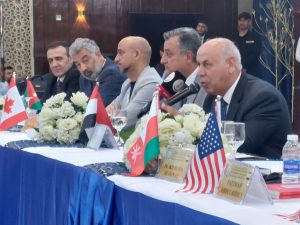
International Intellectual Property Conference in Bagdad, Irak – Interview with Professor Dr Alaa Al-Alaq, Director General of the Department of Cultural Relations
We do not often hear positive news from Iraq, and yet there are so many positive things happening there. The “New Iraq” is in the making some might say. One of the persons contributing to this new Irak is Professor Dr Alaa Al-Alaq, Director General of the Department of Cultural Relations. He is a nice and friendly man who took of his precisous time to answer all our questions. Dr Alaa, the floor is yours…
Q; You are in charge of the intellectual property agency in Iraq. Could you please tell us a little about your background?
I am Professor Dr. Alaa Abo Al Hassan Al Alaak, Director General of the Department of Cultural Relations in the Republic of Iraq. I hold a Ph.D. in the History of International Relations, a Bachelor’s degree in Law, and a diploma in Intellectual Property Law from India, Hyderabad.
I have presented many seminars and conferences on the topic of Intellectual Property Protection.
I am a writer and author on Intellectual Property issues in Iraq, with over twenty publications in Intellectual Property Law.
I have been representing my country, Iraq, in the World Intellectual Property Organization, « WIPO », a United Nations agency in Geneva, since 2008. In 2019, I established the National Center for Copyright Protection and Related Rights in the Ministry of Culture, and then I organized an International Conference on Intellectual Property in 2010-2011.
Q: You just organized another huge international conference in Baghdad, thus putting your country back on the international scene. What is the outcome of the conference, and are you satisfied with it?
One of the greatest achievements we have made in this conference is the dissemination of our message to the entire world, which is that Iraq is a country still pulsating with giving, richness, and creativity, and that its people, who are law enthusiasts, preserve their heritage, culture, and the rights of their creators. Therefore, they always strive for international recognition through creativity, catching up with the experiences of other nations, and benefiting from their experiences to revitalize sustainable development and intellectual property projects. Ideas come from lovers of Iraq and its civilization, from friends who participated in this conference and left their unforgettable mark. Their research contributions were valuable and provided us with qualitative additions to the development of sustainable intellectual property in Iraq.
Q: How would you characterize the current intellectual property situation in your country?
It is not lost on us that intellectual property is evolving rapidly. The issues addressed by intellectual property to preserve innovation and intellect ten years ago are no longer the same. With rapid and urgent development, where there is creativity and innovation, those rights must evolve, support the creators, protect their rights. Similarly, as in other countries, legal awareness of intellectual property rights has become clarified among creators. There is an interest in intellectual property tools and its various branches. Iraqi society has become aware of intellectual property law and its multiple branches, thus enacting new law that suits the current state of affairs and at least matches the general perimeters of countries in its Arab and regional group.
Q: Your country has a rich and impressive history, and it is often associated with the birth of humanity. How do you protect this cultural heritage?
It is not lost on humanity that Iraq is the land of civilizations. It is not an exaggeration to say that we are the owners of the first letters and the land of the first diverse cultures. We possess a glorious and significant heritage, not only for Iraq but for the whole world. It shares and participates with all other civilizations. Surely, preserving this heritage is a sacred duty, especially as Iraq works as a member state to preserve its heritage and culture, and to register its tangible and intangible heritage in the various international organizations, including UNESCO, ALCO, and ISESCO. We are currently working on reviving the idea of preparing the « Iraqi National Register of Intangible Heritage » to submit it to the relevant organizations and register it as Iraqi heritage in line with civilizations.
Q; Finally, Dr Alaa, if you have a message to our readers, what would that be?
First: I invite all those who love Iraq, its civilization, and its people to visit our country because love is created through direct human encounters, good initiatives, and relationships built through literature, art, culture, sports, heritage, theater, cinema, museums, and creativity.
Second: I would like to thank, with all love and respect, your magazine team because they paid literal attention to Iraq, its people, civilization, and highlighted it.
Third: I would like to extend my thanks, through you, to all the beloved ones and friends who made us smile, love, and presented ideas and topics through our Second International Intellectual Property Conference held in Baghdad. We became brothers and sisters, lovers and friends, and we created a group called « Great Baghdad ». Thank you to everyone who contributed to it, prepared it, and left their mark on it. Thanks to the dear creative brother Faik Al-Aboudi, and the writer Lubna Yaseen, giants of the group.








